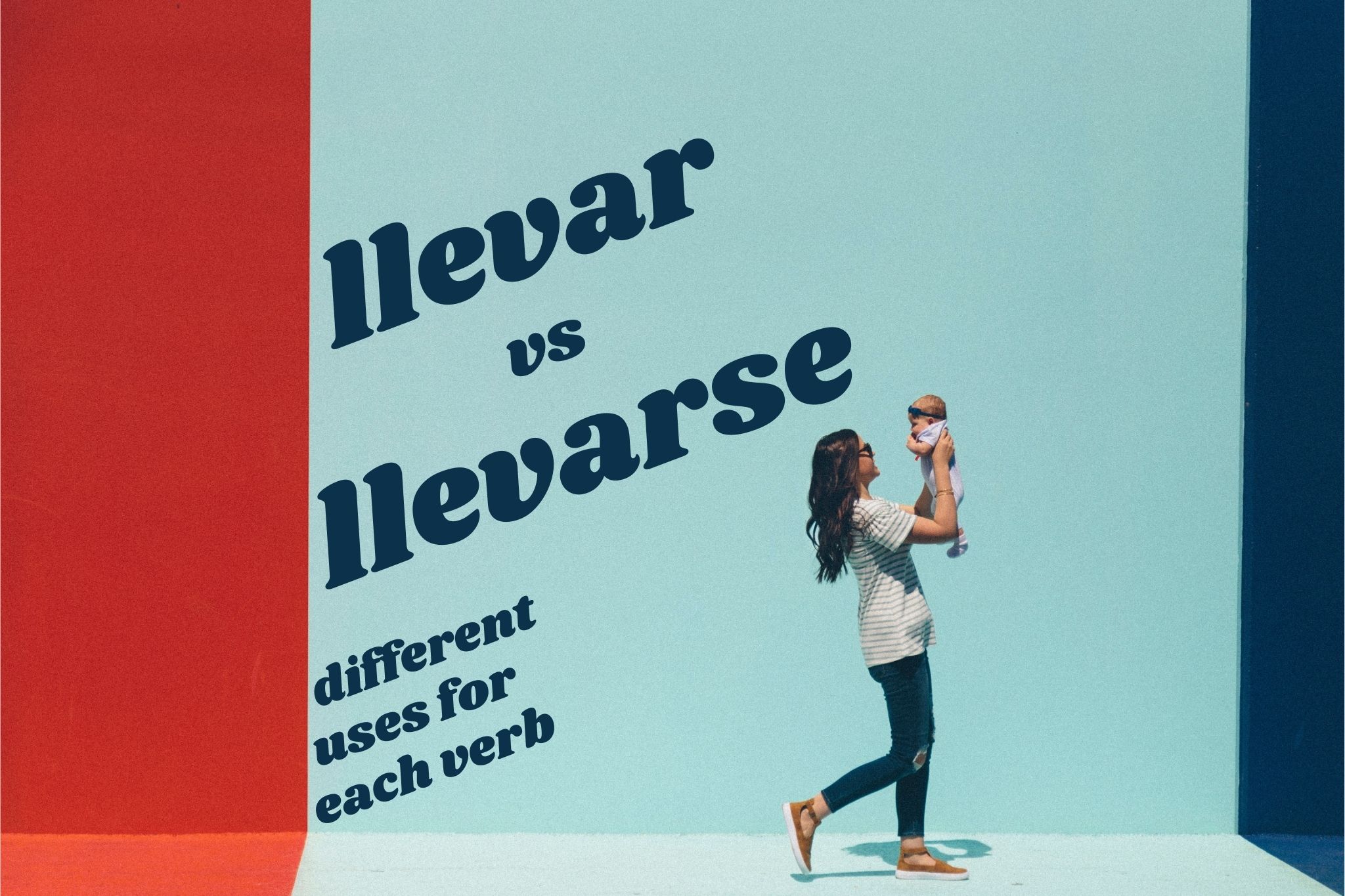Llevar or Llevarse: Different Uses For Each Verb

Get our free email course, Shortcut to Conversational.
Have conversations faster, understand people when they speak fast, and other tested tips to learn faster.
More infoAs a Spanish student, you will have almost certainly come across llevar or llevarse being used in a variety of ways.
At first glance, the only thing that separates these versatile verbs is the reflexive pronoun se, which is one reason that many Spanish students tend to confuse them. However, both verbs are used quite differently.
Let’s break down the main uses of each verb.
Llevar is the Spanish verb for to carry or to take, and is used when speaking about moving or transporting something or someone from one place to another.
- We are going to take the children to school – Vamos a llevar a los niños al colegio
- I’m going to take the car to the mechanic – Voy a llevar el carro al mecánico
Llevarse is the Spanish verb for to take away for oneself. As a reflexive verb, llevarse is used when the subject is doing the action of carrying or taking something for themself.
- I took your new shoes – Me llevé tus zapatos nuevos
- The thief took my wallet – El ladrón se llevó mi cartera
That is the basic, 5-second overview of llevar vs llevarse.
In reality, both of these verbs are used to express more concepts, which don’t necessarily all relate to moving or transporting something.
Let’s dive in to see when to use llevar or llevarse.
How To Use Llevar
As you now know, the verb llevar is used to express transporting or moving something or someone from one place to another.
In this sense of to take or to carry, llevar is similar to another common Spanish verb: traer. For a detailed explanation of that verb, check out our post on the uses, meanings, and conjugation of Traer. We also have another quick post specifically comparing Llevar vs Traer.
However, to carry is not the only meaning of llevar, as you’re about to see. Let’s look at each llevar meaning in turn.
1) To talk about transporting something or someone to a new place
This is the classic meaning of llevar, translated variously as to take, to carry, or to bring. In general, this use implies that the subject is taking the object to somewhere else.
- I’m going to take the dog to the vet – Voy a llevar al perro al veterinario
- I will bring food for all – Yo llevaré comida para todos
- Yesterday I took the car to repair – Ayer llevé el carro a reparación
- I’m taking my sister to the airport – Estoy llevando a mi hermana al aeropuerto
- Remember to carry your passport in your hand – Recuerda llevar tu pasaporte en la mano
- I carry my credit card in case I need it – Llevo mi tarjeta de crédito en caso de necesitarla
- Are you bringing the sunscreen in your bag? – ¿Llevas el protector solar en tu bolso?
2) To indicate what we are wearing
You may know the verb vestir as “to dress,” which is correct, but it’s much more common to hear llevar used when we want to talk about what we are wearing or how we’re dressed.
- I’m wearing a white shirt – Llevo una camisa blanca
- I will wear a black dress for the party – Yo llevaré un vestido negro para la fiesta
- I’m going to take my running shoes – Voy a llevar mis zapatos de correr
3) To talk about ingredients
If you find yourself in the kitchen, then you’ll use llevar to talk about ingredients.
- Does this cake have an egg? – ¿Esta torta lleva huevo?
- The milkshake has ice cream – La merengada lleva helado
- This pizza doesn’t have tomato – Esta pizza no lleva tomate
- What’s in this paella? – ¿Qué lleva esta paella?
4) To talk about the passage of time
When we use the verb llevar to talk about the passage of time, it is a way of replacing the verb tener.
Both verbs are interchangeable when speaking about how much time you have spent doing something
Let’s see some examples:
- Llevar: We’ve been waiting two weeks for an answer – Llevamos dos semanas esperando por una respuesta
- Tener: It’s been two weeks that we’ve been waiting for an answer – Tenemos dos semanas esperando por una respuesta
- Llevar: I’ve been trying to communicate with you for two hours – Llevo dos horas tratando de comunicarme contigo
- Tener: I have spent two hours trying to communicate with you – Tengo dos horas tratando de comunicarme contigo
Let’s see more examples, only with llevar:
- I’ve been studying in Baselang for 3 years – Llevo 3 años estudiando en Baselang
- We’ve been waiting for the flight for four hours – Llevamos cuatro horas esperando el vuelo
- She hasn’t called in two days – Ella lleva 2 días sin llamarnos
- The dogs had been without eating for three days – Los perros llevaban tres días sin comer
5) When you’ve been doing the same thing for a long time
And finally, this one is similar to what we mentioned in the last section, but using a specific structure related to the present progressive.
We use the verb llevar + gerund to indicate that we have been doing an action for a long time, and the action is ongoing.
Formula: Llevar + action verb in present progressive + complement
- I’ve been living in Spain for 6 months – Llevo viviendo en España 6 meses
- We have been friends all our lives – Llevamos siendo amigas toda la vida
- He has been rehearsing all morning – Él lleva ensayando toda la mañana
How to use Llevarse
When we use llevarse vs llevar, we don’t always imply carrying something to somewhere, because the place may be optional. Instead, llevarse indicates that we are taking something or someone with us.
Remember, the reflexive pronoun se makes this a reflexive verb, which means that the action is being executed by the same person.
Now let’s explore the many different ways that you can use llevarse
1) Take something or someone from a place to take it with you
You can use llevarse to say that you took something, either because you borrowed it, or for example, or you saw something in a store that you liked a lot and want to take it with you (to buy it).
It also works to express something being taken in a violent situation, such as a robbery.
- I really like these pants, I’ll take it. – Me gusta mucho este pantalón, me lo llevo
- The thief took all the money – El ladrón se llevó todo el dinero
- My husband took the car this morning – Mi esposo se llevó el carro esta mañana
2) To talk about relationships with people
This may sound strange when translated directly into English, but llevarse is commonly used to talk about relationships. Think about it as describing how the relationship carries on, which can be well or badly.
- My mother-in-law and I get along – Mi suegra y yo nos llevamos bien
- The manager is very rude, he is on bad terms with the whole staff – El gerente es muy grosero, él se lleva mal con todo el personal
- Dogs and cats get along – Los perros y gatos se llevan bien
- How is your relationship with your sister-in-law? – ¿Cómo te llevas con cuñada?
3) To talk about what’s fashionable
- Long hair is fashionable again. – El cabello largo se lleva mucho ahora, está de moda otra vez.
- These winter grey colors are fashionable – Este invierno se llevan los colores grises
- These shoes are very popular. All young men wear them – Estos zapatos son muy populares. Todos los jóvenes los llevan
4) To talk about an experienced feeling or emotion
- He had a big surprise when he saw his son arrive – Se llevó una gran sorpresa cuando vió a su hijo llegar
- We took a major fright when the child fell – Nos llevamos un susto muy grande cuando el niño se cayó
- I feel great sadness in my heart to see him in such a bad state – Me llevo una gran tristeza en el corazón por verle tan mal
- Your mom will be surprised to see you – Tu mamá se llevará una gran sorpresa al verte
Conclusion: Llevar vs Llevarse
So far so good! We’ve seen each of the uses of both verbs, so now you know when to use llevar or llevarse.
Remember that the main use of llevar is for taking something to somewhere, while the pronominal verb llevarse is focused more on who is doing the taking.
Both llevar and llevarse have a couple of other nuances that we looked at too, such as describing the passage of time, how relationships are faring, wearing clothes, and popular fashions. We’ll leave you with a set of exercises so you can practice when to use llevar or llevarse!
Llevar or Llevarse: Exercises
A) Choose the right option for every sentence
Options: llevó – llevaré – llevar – llevó – llevé
- Vamos a _____ a los niños al cine (We’re going to take the kids to the movies)
- Yo _____ la pizza esta noche (I’ll take the pizza tonight)
- Ayer _____ a mi gato al veterinario (I took my cat to the vet yesterday)
- Mi hermano se _____ todo el vino que quedaba (My brother took all the wine that was left)
- La policía se _____ mi carro (The police took my car)
B) Choose correct or incorrect. Correct if necessary
- Esta pizza no lleva anchoas (This pizza does not have anchovies)
- Tendré 3 horas esperando por el gerente (I’ve been waiting for 3 hours for the manager)
- ¿Puedes decirme que me lleva esta pasta? (Can you tell me what’s in this pasta?)
- Llevamos viviendo 5 años en Perú (We have been living in Peru for 5 years)
- Él llevó un mes viajando por el Caribe (He has been traveling in the Caribbean for a month)
C) Fill in the blank
- El ladrón se _____ todos los celulares (The thief took all cell phones)
- La abuela se _____ una gran sorpresa en su cumpleaños (Grandma will have a big surprise on her birthday)
- Ellos _____ dos días perdidos en el bosque (They had been lost two days in the forest)
- Los niños _____ su comida al colegio (Children take their food to school)
Answers
A) Choose the right option for every sentence
- Vamos a llevar a los niños al cine
- Yo llevaré la pizza esta noche
- Ayer llevé a mi gato al veterinario
- Mi hermano se llevó todo el vino que quedaba
- La policía se llevó mi carro
B) Choose correct or incorrect
- Esta pizza no lleva anchoas (correct)
- Llevo 3 horas esperando por el gerente (changed tendré for llevo)
- ¿Puedes decirme que lleva esta pasta? (changed me lleva for lleva)
- Llevamos viviendo 5 años en Perú (correct)
- El lleva un mes viajando por el Caribe (changed llevó for lleva)
C) Fill in the blank
- El ladrón se llevó todos los celulares
- La abuela se llevará una gran sorpresa en su cumpleaños
- Llevaban dos días perdidos en el bosque
- Los niños llevan su comida al colegio



